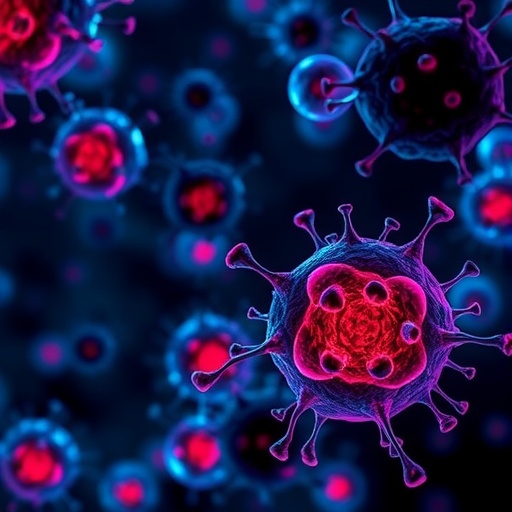A groundbreaking study from Weill Cornell Medicine has unveiled a previously unknown molecular mechanism through which tumors incapacitate the immune system, specifically by driving T cell exhaustion. This discovery not only deepens scientific understanding of tumor immunology but also points toward novel ways to reinvigorate the immune response against cancer, potentially revolutionizing the efficacy of immunotherapies. Published in the prestigious journal Nature Immunology on November 17, 2025, the research uncovers how blocking a newly identified molecular pathway can restore the functionality of exhausted T cells, which are critical players in the body’s defense against malignant cells.
For decades, oncologists and immunologists have grappled with the challenge of T cell exhaustion, a state wherein T cells, after persistent stimulation by cancer antigens or chronic infections, lose their ability to mount effective anti-tumor responses. Although these exhausted T cells retain recognition of cancer-specific antigens, their cytotoxic activity becomes blunted, allowing tumors to progress unchecked. The immune checkpoint protein PD1 has long been implicated in this process, with therapies aimed at inhibiting PD1 reviving T cell activity and yielding impressive clinical results in cancers such as melanoma. However, resistance and diminishing responses in a substantial subset of patients have driven researchers to probe deeper into the molecular brakes that tumors use, seeking alternative or complementary targets.
The team led by Dr. Taha Merghoub and Dr. Jedd Wolchok sought to explore whether CD47, a surface molecule with known “don’t eat me” functions that protect cancer cells from macrophage-mediated destruction, plays a role in T cell exhaustion. Notably, their investigations revealed a transformative insight: CD47 is not just expressed on tumor cells but is also upregulated on T cells themselves, especially in their exhausted state. This unexpected discovery pointed to CD47 functioning as an intrinsic checkpoint in T cells, where its increased expression correlates with diminished immune surveillance and tumor control.
Through rigorous in vivo modeling, the researchers demonstrated that mice genetically deficient in CD47 experienced delayed tumor development, implicating CD47 expression on immune cells as a factor driving immune suppression. More intriguingly, T cells devoid of CD47 showed enhanced tumor-fighting abilities compared to their CD47-expressing counterparts, providing compelling experimental evidence that CD47 acts as an exhaustion facilitator within T cells. This revelation challenges the conventional paradigm that primarily considered CD47 as a shield for cancer cells and expands its functional repertoire into immune regulation.
Delving further, the scientists examined how the tumor microenvironment may exploit this newfound T cell CD47 pathway. They identified thrombospondin-1 (TSP-1), a large matricellular protein frequently secreted by metastatic tumors, as a critical ligand that binds CD47. Mice lacking thrombospondin-1 similarly exhibited reduced T cell exhaustion, validating the role of the CD47-TSP-1 interaction in promoting immune cell dysfunction. This finding was a pivotal moment in the research—establishing the TSP-1:CD47 molecular axis as a key modulator of T cell vitality within tumors.
To translate this mechanistic understanding into therapeutic potential, the team employed the TAX2 peptide, a selective inhibitor designed to disrupt the binding between TSP-1 and CD47. Treatment of mouse models bearing melanoma and colorectal tumors with TAX2 resulted in preserved T cell function, enhanced cytokine production, increased tumor infiltration by immune cells, and ultimately, significantly slowed tumor growth. These data represent an encouraging proof-of-concept that targeting the TSP-1:CD47 pathway can reverse T cell exhaustion and invigorate anti-tumor immunity.
Perhaps most strikingly, the study also revealed that TAX2 acts synergistically with PD-1 blockade therapies, amplifying T cell reactivation and improving tumor control beyond what either intervention could achieve alone. This synergy underscores the potential for combination immunotherapies focusing on multiple exhaustion pathways to overcome resistance and sustain durable anticancer immune responses. Based on these promising preclinical results, Dr. Merghoub and his colleagues envision expanding their research to identify upstream and downstream regulators of the TSP-1:CD47 signaling axis, aiming to develop targeted therapeutics capable of safely and effectively modulating this pathway in human patients.
The implications of this research are far-reaching. By exposing a novel mechanism employed by tumors to subvert the immune system, it opens avenues for next-generation immunotherapies that enhance T cell persistence and functionality. Since T cell exhaustion represents a significant obstacle limiting the success of current immune checkpoint inhibitors, therapies disrupting the CD47-TSP-1 interaction could become instrumental in extending benefits to a wider patient population. Moreover, the dual blockade of PD1 and CD47 pathways may offer a powerful strategy to counteract tumor immune evasion, potentially transforming clinical cancer management.
This study exemplifies the synergy of basic molecular immunology with translational cancer research. It showcases how dissecting complex cellular interactions at the protein signaling level can reveal unexpected therapeutic targets, shifting the paradigm from solely targeting tumor cells to also manipulating immune cell phenotypes. The hope is that, with continued investigation and clinical development, interventions based on these findings will provide durable, efficient, and broadly applicable cancer immunotherapies, ultimately harnessing the immune system’s full power to defeat tumors.
As the scientific community progresses in understanding tumor-driven immune suppression, the CD47-TSP-1 discovery shines as a beacon guiding future efforts. By selectively severing this pathological crosstalk, researchers aim not only to halt tumor progression but also to restore the immune system’s intrinsic capacity to eliminate cancer. With ongoing preclinical and forthcoming clinical studies, the vision of revitalized and resilient T cells growing ever closer portends a hopeful era in oncology.
Subject of Research: Molecular mechanisms of T cell exhaustion and tumor immune evasion
Article Title: Tumors exploit the CD47-Thrombospondin-1 axis to induce T cell exhaustion and immune escape
News Publication Date: 17-Nov-2025
Web References: https://www.nature.com/articles/s41590-025-02321-5
Keywords: T cell exhaustion, CD47, thrombospondin-1, immunotherapy, immune checkpoint, PD1, cancer immunology, tumor microenvironment, melanoma, colorectal cancer, immune evasion, immune reprogramming




